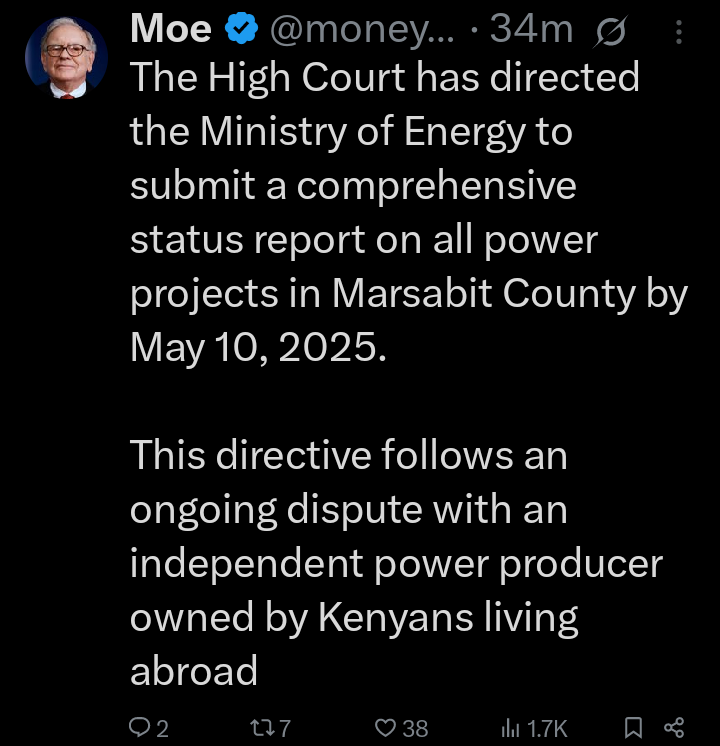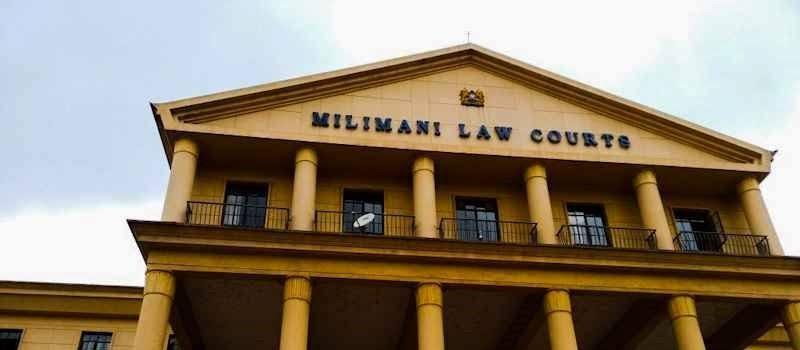The High Court has directed the Ministry of Energy to provide a comprehensive report on power projects in Marsabit County by May 10, 2025. This order comes after a long-standing dispute involving Gitson Energy Limited, a company owned by Kenyans in the diaspora, which has faced significant delays in implementing its 300MW wind power project in Marsabit.
The directive highlights ongoing concerns about transparency and accountability in Kenya’s energy sector, with legal battles between investors and the government being a recurrent theme.
Marsabit County, known for its renewable energy potential, particularly wind and solar power, is home to one of Africa’s largest wind farms, the Lake Turkana Wind Power Plant. However, despite the region’s promise for clean energy, projects in the area have been hampered by issues such as land gazettement and bureaucratic delays. Gitson Energy, which received approval for the wind project back in 2010, has struggled to get its project off the ground, facing obstacles like slow government processing and lack of adequate support.
The court’s recent order, issued on April 25, 2025, requires the Ministry of Energy to release a detailed list of all power projects approved in Marsabit County up until December 31, 2021. This list should include vital information such as the name of each project, its capacity, the approval date, and its current status.
This move is part of ongoing efforts to bring more transparency to the sector, especially given the legal troubles faced by Gitson Energy, which has been fighting the Ministry’s failure to comply with previous court rulings. In fact, the company had previously won a court battle in 2021, which saw the government ordered to include its project in the list of approved initiatives.

Despite this, delays continued, prompting the latest legal action. This order from the High Court has stirred both optimism and skepticism. On one hand, it could set a precedent for increased transparency in the energy sector, which would benefit future investors and help address the bureaucratic inefficiencies that have plagued the sector.
On the other hand, there are concerns about the government’s ability or willingness to comply with the order. As highlighted by reactions on social media, there is a sense of disillusionment about the government’s commitment to following through on promises, with some questioning whether this will be another case of bureaucracy blocking progress.
The upcoming deadline of May 10, 2025, will be crucial. If the Ministry complies, it could help move the Gitson Energy project forward, allowing it to join other successful renewable energy projects in the country. However, failure to meet the deadline could further damage the relationship between the government and private investors, potentially leading to a loss of confidence in Kenya’s energy sector.
At the centre of this dispute is the role of the Kenyan diaspora, whose investments in projects like Gitson Energy are vital for the country’s economic growth. While the diaspora can bring in much-needed capital, conflicts can arise, particularly when local stakeholders feel that their interests are being sidelined or when regulatory hurdles seem insurmountable.
The government’s handling of this situation will therefore have far-reaching implications, not only for Marsabit’s energy development but also for the broader perception of Kenya as an investment destination.
The court’s directive is more than just a legal requirement; it is a test of the government’s commitment to creating a transparent and efficient energy sector. If the Ministry of Energy fails to meet the deadline, it could exacerbate existing tensions, stall much-needed renewable energy projects, and further discourage investors.
On the other hand, a positive outcome could signal a shift towards greater accountability, benefiting both the local community and the country as a whole.





















Add Comment